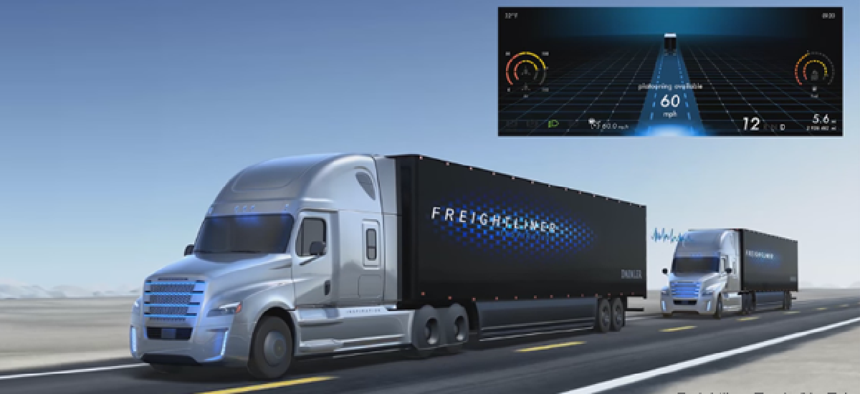Government keeps autonomous trucking in gear

In its capacity as both a safety watchdog and a commercial vehicle user, government plays a role in the development of the automated vehicles -- for large fleets and consumer vehicles alike.
In its capacity as both a safety watchdog and a commercial vehicle user, government plays a role in the development of the automated vehicles –for large fleets and consumer vehicles alike.
Nevada made automobile history in 2012 when Gov. Brian Sandoval worked with Google to establish licensing rules for testing so-called “autonomous” vehicles on the state’s highways. The effort moved into higher gear last May when the state licensed an autonomous Daimler Freightliner Inspiration Truck to operate on public roads. “The application of this innovative technology will have a lasting impact on our state and help shape the new Nevada economy," Sandoval said at an event marking the effort.
On Jan. 14, national efforts kicked into overdrive. Department of Transportation Anthony Foxx announced a 10-year, nearly $4 billion investment to test connected vehicle systems and work with industry to ensure a common multistate framework for connected and autonomous vehicles. Additionally, the National Highway Traffic Safety Administration will encourage the development and adoption of technologies using vehicle-to-vehicle and vehicle-to-infrastructure communications.
However, autonomous vehicles are not just around the corner. Agencies and industry are working to bring incrementally more advanced technologies to vehicles. And while consumer automakers are testing sexier features such as self-parking cars and stereo gesture controls, commercial trucking fleets have embraced technologies – such as GPS trackers and fuel monitors – to improve safety and efficiency.
In December 2015, the DOT’s Federal Motor Carrier Safety Administration issued a set of safety regulations mandating the use of technologies to help commercial fleet drivers maintain strict hours of service to order to help prevent fatigue-related accidents. The mandate now going into effect requires commercial trucks over 26,000 pounds to be equipped with an electronic logging device, a system designed to easily track hours of service compliance.
An ELD is connected to the truck’s engine to record a truck’s motion. It allows the driver to log-in and select whether he is on duty or off duty and displays a record of duty so a driver can quickly note his remaining hours of service. Data from the ELD can be transmitted to law enforcement agencies via wireless systems, USB or Bluetooth. By 2017, all commercial drivers required to keep a record of duty status must use an ELD to document their compliance with hours of service rules.
Government organizations operating trucking fleets are exempt from the regulations. Even so, “most agencies subscribe to the federal rules as a matter of practice,” said Rob Abbott, vice president for safety policy at the American Trucking Association.
“Fleets who have used [ELDs] have improved their ability to monitor productivity,” Abbott said. “So it’s reasonable to expect government agencies would find the same and adopt them voluntarily.”
The General Services Administration took a step in that direction when it contracted with vendors for various trucking “telematics” features for some government fleets. In December, it awarded AT&T a five year contract to equip 204,000 vehicles leased through GSA Fleet with GPS vehicle tracking, vehicle monitoring and diagnostics capabilities to improve the efficiency of its fleet operations. The tools assist agencies with improving operator safety, efficiently managing fleet fuel usage and cutting costs and greenhouse gas emissions, said Mike Leff, vice president-civilian, AT&T Government Solutions.
GSA also extended a contract with Fleet Management Solutions, a division of GPS software developer Teletrac, for GPS tracking and telematics for vehicles and heavy equipment. The firm said it is adding systems that improve on-road performance and meet mandates for lowering fuel consumption, decreasing carbon emissions, optimizing fleet size and automating mandatory reporting, including hours-of-service software.
ELD systems are one of a number of applications now being developed to automate the safety and operations of large commercial vehicles, particularly traditional 18-wheelers weighing in at over 26,000 pounds.
While hours of service systems help protect drivers from extended overtime shifts, fatigue is not the biggest safety risk faced by commercial truck drivers.
“Not by a long shot,” Abbott said. “The single greatest contributor to crashes is vehicle speed.” For that reason the ATA anticipates a proposal will be issued by the government “soon” to mandate the use of speed governors on trucks, which is already done voluntarily by portions of the industry, according to Abbott.
EDL has become a term to describe an array of emerging safety applications, including speed and hours-of-service controls designed to automate the collection of data from trucks in motion and make necessary corrections in real time.
Today’s truck fleets are increasingly being equipped with multifunction fleet management systems, offering navigation, electronic logging and Bluetooth services, Abbott said. Similarly, many truck fleets offer messaging, routing optimization and ELD reporting.
Autonomous trucking features now available focus on helping truckers avoid hazards while operating vehicles, Abbott said, including devices that alert drivers to vehicles in their blind spots. Other systems warn drivers when they stray from marked lanes and automatically apply brakes when distances between vehicles are too close.
Looking ahead, Abbott envisions many such features will be embedded as a single suite by original equipment manufacturers. Larger motor carriers will tell the OEM what they autonomous features they need so vehicles are built to order, he said.
NEXT STORY: CBP intercepts drug-smuggling drone





